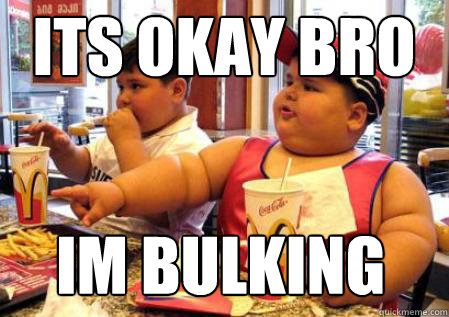Here you will learn all the basics for losing fat and gaining muscle.
In Lesson 2 I set some guidelines for protein, carbohydrates, fat and total calories, and set my own targets which I’ll put below:
Workout Days: Protein (140 grams) – Carbs (290 grams) – Fat (75 grams) – Total Calories (2400)
Rest Days: Protein (140 grams) – Carbs (160 grams) – Fat (110 grams) – Total Calories (2200)
In the last episode I changed these numbers to lose fat, now I’m going to alter them to gain muscle.
Increase Protein
If I had to guess what most guys think they should do to gain muscle, it would be to eat more protein. Yes they are the building blocks of muscle, but most of the extra calories are going to come from carbohydrate.
What I am going to do is take my protein to the upper limit, which for someone lifting weights is 2 grams of protein for every kilo of bodyweight. I weigh 75 kilos, so that’s 150 grams of protein. Remember, if your weight changes up or down by a big margin you need to recalculate. If I put on muscle and got to 80kg, my new body will need more calories to grow.
Here are my updated numbers:
Gym Day: Protein 150 Carbs 290 Fat 75 Calories 2440
Rest Day: Protein 150 Carbs 160 Fat 110 Calories 2240
Reduce Fat
If I want to gain muscle I don’t want to go too high on fat, so I’m going to lower my intake. I’m going to take 15 grams of fat off my Gym Days and my Rest days, leaving me with 60 grams and 95 grams. The lower limit is around 1 gram of fat per kilo of body-weight, and although I’m below 75 on my gym days, I’m higher on my rest days, so over a week it will average out.
Gym Day: Protein 150 Carbs 290 Fat 60 Calories 2300
Rest Day: Protein 150 Carbs 160 Fat 95 Calories 2100
Create a Calorie Surplus
All that’s left now is to increase carbohydrate so I’m in a calorie surplus. That means I’m eating more calories than I burn, and if I’m lifting weights that should hopefully turn into muscle. How much you increase will determine how much muscle you gain, but it’s not as simple as eating as much as you can.
If I eat an extra 2000 calories a day, i’m unlikely to put on a pound of muscle every two days. Instead, most of it will be stored as fat.
What you need to experiment with is how many extra calories will maximise your muscle growth without storing a lot of body fat.

This calorie surplus is often called “bulking”, and for some guys it’s an excuse to eat everything in sight. If they do this, they might end up 20lbs heavier, but only 2lbs is muscle and the other 18lbs of it is fat. On the other hand, going up by 300-400 calories per day could mean you add only 4lbs of body-weight, but it might be 2lbs of muscle and 2lb of fat.
It’s not realistic for 100% of your weight gain to be muscle, so you might lose a bit of definition in your abs or arms, that’s okay. However, if you start getting chubby then your calories are too high and you need to back off.
As an example for myself I would increase by 300 calories and see how I get on. That’s potentially 3 lbs of muscle a month, so if I’m 75 kilos in January I’d be 89 kilos at the end of the year. That’s pretty substantial.
If you try the 300 surplus for two weeks without any change, add another 100. As I’ve said before, it’s trial and error. I can’t give you exact numbers because everyone’s different.
If I add 300 calories to my earlier numbers my new numbers will be 2700 and 2500. That’s an extra 400 calories on the numbers you see below. Taking 400 / 4 gives me 100 grams of carbs. So adding 100 grams to each day will look like this.
Gym Day: Protein 150 Carbs 390 Fat 60 Calories 2700 (22% 58% 20%)
Rest Day: Protein 150 Carbs 260 Fat 95 Calories 2500 (24% 42% 34%)
You might think it looks like a lot, but those extra carbs will be fuelling your hard workouts to let you stimulate growth.
Now as I say, this is a guideline. If I don’t see progress, maybe I bump my protein to 160, or I add another 25 grams of carbs. If I’m really hungry on workout days, maybe I add 30 grams of carbs there. It’s all about finding what works for you.
Two things you want to be tracking are:
- How much you weigh. You could do this maybe twice a week. Remember: same time of day, same clothing
- How you look in the mirror. You will have daily fluctuations due to water retention, but week to week you should pay attention to your body composition (muscle vs. fat).
In Lesson 5 I’m going to cover nutrient timing. That’s just a fancy way of saying how you should space out your protein, carbs and fat at each meal to maximise results.

